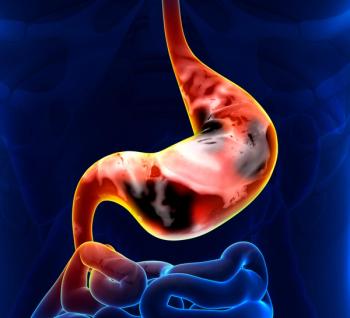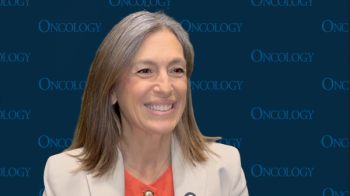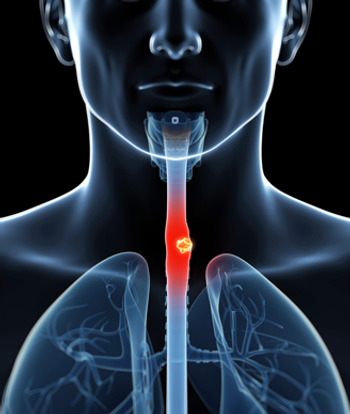
- ONCOLOGY Vol 16 No 5
- Volume 16
- Issue 5
Irinotecan/Cisplatin in Advanced, Treated Gastric or Gastroesophageal Junction Carcinoma
We conducted a phase II study to assess the response rate and toxicity profile of the irinotecan (CPT-11, Camptosar) plus cisplatin combination administered weekly to patients with at least one previous chemotherapy for advanced adenocarcinoma of the stomach or gastroesophageal junction. Patients with histologic proof of adenocarcinoma of the stomach or gastroesophageal junction with adequate liver, kidney, and bone marrow functions were treated with 50 mg/m² of irinotecan plus 30 mg/m² of cisplatin, both administered intravenously 1 day a week for 4 consecutive weeks, followed by a 2-week recovery period.
ABSTRACT: We conducted a phase II study to assess the response rate and toxicity profile of the irinotecan (CPT-11, Camptosar) plus cisplatin combination administered weekly to patients with at least one previous chemotherapy for advanced adenocarcinoma of the stomach or gastroesophageal junction. Patients with histologic proof of adenocarcinoma of the stomach or gastroesophageal junction with adequate liver, kidney, and bone marrow functions were treated with 50 mg/m² of irinotecan plus 30 mg/m² of cisplatin, both administered intravenously 1 day a week for 4 consecutive weeks, followed by a 2-week recovery period. Response rate, time to disease progression, survival, and toxic effects were analyzed. Of 32 registered patients, 29 were assessable. Nine patients (31%) achieved a partial response. Median time to disease progression was 7 weeks (range: 5-48+ weeks) and median survival time was 5 months (range: 2.5-31 months). There were no treatment-related deaths. Major toxic effects included diarrhea, neutropenia, and fatigue. Of 260 doses administered in 65 6-week courses, 46 doses were either delayed or missed. Most delayed or missed doses occurred in the third or fourth week of the cycle. We concluded that the combination of irinotecan and cisplatin is an active second-line therapy for patients with advanced gastric or gastroesophageal adenocarcinoma in whom one previous chemotherapy has failed. Modifications in doses and schedule are warranted to increase the tolerability of the regimen. Phase III trials are necessary to establish the clinical utility of irinotecan/cisplatin in these patient populations. [ONCOLOGY 16(Suppl 5):16-18, 2002]
Although advanced disease remains incurable, chemotherapy can be palliative. Compared with best supportive care alone, combination chemotherapy improved quality of life and overall survival in four small randomized trials.[3-6] Once patients have not responded to front-line chemotherapy (often fluorouracil- or cisplatin-based), there is no established second-line chemotherapy for these patients.
The combination of irinotecan (CPT-11, Camptosar) and cisplatin has demonstrated activity as first- and second-line therapy for gastric carcinoma.[7] We performed a phase II trial of this regimen using a previously established treatment schedule[8] in patients who have had at least one previous systemic chemotherapy. Preliminary results are presented here.
Patients and Methods
Patients with histologic proof of advanced gastric or gastroesophageal adenocarcinoma, with measurable disease, were eligible for inclusion in the study. They were required to have an absolute granulocyte count of 1,500/µL or more, a hemoglobin level of 8 g/dL or more, and a platelet count of 100,000/µL or more; serum bilirubin level of 1.5 mg/dL or less, serum creatinine level of 1.5 mg/dl or less; life expectancy of more than 3 months; and a performance status of 2 or less on the Zubrod scale. Patients must have received at least one previous chemotherapy regimen (that did not include a topoisomerase I inhibitor). The Institutional Review Board approved the study, and all patients provided written informed consent.
Pretreatment evaluation included a complete blood cell count, multichannel chemical survey, and electrolyte measurement. All patients underwent computed tomography of the abdomen and pelvis (if indicated), chest radiography, and other imaging studies if necessary. A complete history was obtained and a physical examination was performed prior to study entry.
Chemotherapy consisted of 50 mg/m² of irinotecan given intravenously (IV) over 90 minutes followed by 30 mg/m² of cisplatin IV over 60 minutes. Both drugs were administered 1 day per week for 4 consecutive weeks, followed by a recovery period of 2 weeks. Thus, one cycle was 6 weeks long (4 weeks of therapy and 2 weeks of recovery).
Chemotherapy was administered in the outpatient setting. All patients received hydration before and after the cisplatin, and were premedicated with IV dexamethasone, lorazepam, and ondansetron (Zofran) to prevent emesis. Patients received extensive verbal and written instructions regarding early therapy for diarrhea; they were given oral medications to reduce the severity of delayed nausea and vomiting, and loperamide to reduce the severity of diarrhea. Standard response and toxicity definitions were used.
Results
Characteristics of the 32 patients entered in the study are outlined in Table 1. Median age was 50 years; median performance status was 1 (range: 0-2). Table 2 shows chemotherapies patients had received previously.
Among 29 patients assessable for response and toxicity, 9 (31%) had partial responses. Time to progression was 7 weeks (range: 5-48+ weeks), and the median overall survival time was 5 months (range: 2.5-31 months).
No treatment-related deaths occurred. Observed toxicities are listed in Table 3. A total of 46 of 260 doses in 65 6-week courses were either delayed or missed. Most of the delayed or missed doses occurred in the third or fourth week of the cycle.
Discussion
Our results showed that irinotecan plus cisplatin is an active combination in previously treated patients with advanced gastric carcinoma. Irinotecan has single-agent activity against gastric carcinoma, as shown in data from Japan involving patients with treated and untreated gastric carcinoma.[9] The 31% response rate achieved in our study is consistent with results obtained in other phase II studies[10,11] and reaffirms the activity of irinotecan plus cisplatin. The median survival of 5 months (in the second-line therapy setting) may be considered quite reasonable, yet the survival end point is more appropriately addressed in a phase III trial than in a phase II trial. Activity of this combination in untreated patients has been reported.[7]
There is no established second-line therapy for patients with advanced gastric carcinoma, yet many patients who qualify for first-line therapy are still in good physical condition when second-line therapy becomes necessary. We propose a phase III trial comparing best supportive care (or any phase I study) vs irinotecan plus cisplatin in patients in whom first-line therapy has failed. As previously emphasized, the schedule of this regimen needs to be modified to improve patient tolerability.
References:
1. Parkin DM, Pisani P, Ferlay J: Global cancer statistics. CA Cancer J Clin 49:3-64, 1999.
2. Jemal A, Thomas A, Murray T, et al: Cancer statistics 2002. CA Cancer J Clin 52(1):23-47, 2002.
3. Murad AM, Santiago FF, Petroianu A, et al: Modified therapy with 5-fluorouracil, doxorubicin, and methotrexate in advanced gastric cancer. Cancer 72:37-41, 1993.
4. Pyrhonen S, Kuitunen T, Kouri M: A randomized, phase III trial comparing fluorouracil, epidoxorubicin and methotrexate (FEMTX) with best supportive care in non-resectable gastric cancer (abstract). Ann Oncol 3(suppl):12, 1992.
5. Glimelius B, Hoffmann K, Haglund U, et al: Initial or delayed chemotherapy with best supportive care in advanced gastric cancer. Ann Oncol 5:189-190, 1994.
6. Scheithauer W, Komek G, Zeh B, et al: Palliative chemotherapy versus supportive care in patients with metastatic gastric cancer. A randomized trial (abstract). Second International Conference on Biology, Prevention, and Treatment of GI Malignancy, p 68. Koln, Germany, 1995.
7. Ajani JA, Baker J, Pisters PW, et al: CPT-11 plus cisplatin in patients with advanced, untreated gastric or gastroesophageal junction carcinoma . Results of a phase II study. Cancer 2002 (in press).
8. Saltz LB, Spriggs D, Schaaf LJ, et al: Phase I clinical and pharmacologic study of weekly cisplatin combined with weekly irinotecan in patients with advanced solid tumors. J Clin Oncol 16:3858-3865, 1998.
9. Kambe M, Wakui A, Nakao I, et al: A late phase II study of irinotecan (CPT-11) in patients with advanced gastric cancers (abstract 584). Proc Am Soc Clin Oncol 12:198, 1993
10. Shirao K, Shimada Y, Kondo H, et al: Phase I-II study of irinotecan hydrochloride combined with cisplatin in patients with advanced gastric cancer. J Clin Oncol 15:921-927, 1997.
11. Boku N, Ohtsu A, Shimada Y, et al: Phase II study of a combination of irinotecan and cisplatin against metastatic gastric cancer. J Clin Oncol 17:319-23, 1999.
Articles in this issue
over 23 years ago
Promising New Treatment Option for Primary Bone Canceralmost 24 years ago
Anastrozole Receives FDA Priority Review for Early Breast Cancer Indicationalmost 24 years ago
Irinotecan, Cisplatin, and Radiation in Esophageal Canceralmost 24 years ago
Irinotecan for the Treatment of Cervical Canceralmost 24 years ago
Irinotecan in Epithelial Ovarian Canceralmost 24 years ago
Combined-Modality Therapy for Rectal Cancer Using Irinotecanalmost 24 years ago
Future Directions in Adjuvant Therapy for Rectal Canceralmost 24 years ago
Irinotecan and Gemcitabine in Patients With Solid Tumors: Phase I TrialNewsletter
Stay up to date on recent advances in the multidisciplinary approach to cancer.




































